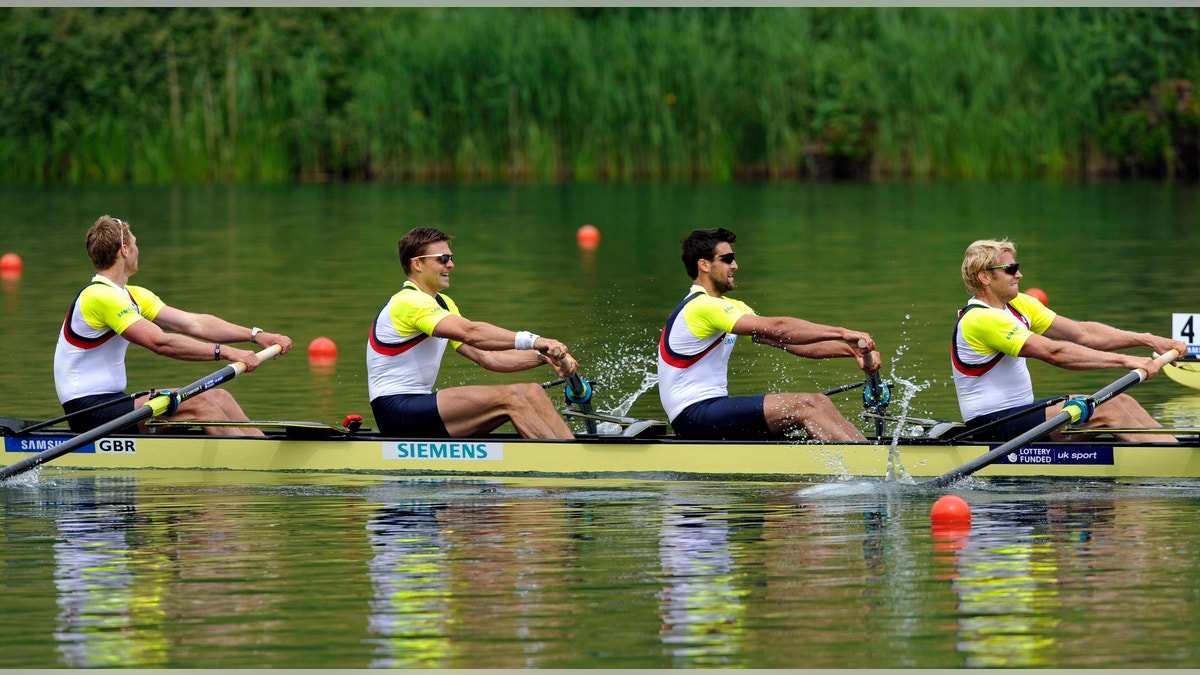
May 27, 2012: Alex Gregory, Pete Reed, Tom James and Andrew Triggs Hodge of Britain during the Men's Quadruple Final A race at the World Rowing Cup on Lake Rotsee in Lucerne, Switzerland. (AP)
LONDON – For Britain's powerhouse rowing squad, it's impossible to escape the shadows cast by Steve Redgrave and Matthew Pinsent.
The great British Olympians dominate the patriotic highlight segments on local TV. There are shots of Redgrave grimacing in his boat as it pulls clear for another gold, a beaming Pinsent clutching his medal on the podium stand. Images of the pair are all over British rowing's training base and the country's leading clubs.
The next generation of British crewmen and women are hoping to add to that legacy this summer in London.
"The standard in the sport is so high," said Andrew Triggs Hodge, a member of Britain's flagship men's four crew. "We've got predecessors like Redgrave and Pinsent who've set the bar high. We're looking to push on from there."
It sure looks as if the home fans will have plenty of reasons to cheer this summer.
Australia, New Zealand and Germany had strong showings in recent world championships and World Cup regattas. The United States and Canada could make the London podium, too.
But Britain is the favorite to top the medals table out on the rippling waters of Dorney Lake near Windsor, the most green and pleasant of all the Olympic venues.
"We are on the trajectory to produce Team GB's best ever results," British Rowing performance director David Tanner said.
Rowing is the only sport in which Britain has won gold at every games since 1984, and the program has received $42 million in lottery and government funding during this Olympic cycle, an unprecedented figure.
Added pressure comes along with the increased attention, but recent success suggests several rowing medals might have a short trip to their permanent homes. Britain won most of the points in the trio of World Cup events across May and June. It also won the most medals and golds at last year's world championships and the 2008 Olympics.
With the eight-day rowing schedule beginning the day after the opening ceremony, the host nation is counting on its rowers to generate a positive vibe that could help increase the country's medal count in other sports as well.
Of course, there are plenty of potential potholes that could derail those hopes.
Britain is favored to win the men's four as well as the women's pair and double sculls. Then it gets tricky.
Traditional power Germany is the only nation to qualify for all 14 disciplines and has a men's eight that hasn't lost since 2009.
Australia is coming off its best performance at the world championships. It brought home a record 10 medals and contested 16 of the 18 finals in the Slovenia city of Bled last year. Drew Ginn in the men's four is aiming for a fourth straight Olympic gold after returning from a two-year sabbatical, and his boat recently ended Britain's dominance in that event at the World Cup race in Munich.
New Zealand has a men's pair in Hamish Bond and Eric Murray that is unbeaten since combining in 2009. Mahe Drysdale is a strong contender in men's single sculls, and Louise Ayling and Julia Edward could capture gold in women's lightweight double sculls.
"They are a complete package, a once-in-a-generation pair," Kiwi double sculler Nathan Cohen said of Bond and Murray.
The best race of the Olympic schedule could the women's eight, where reigning Olympic champion United States is defending an amazing six-year winning streak. Canada came close to ending that run in Lucerne last month, losing out by just 0.03 seconds.
"It just goes to show that the women's eight is going to be a barn burner in London," U.S. coxswain Mary Whipple said. "And we're prepping for it. We know we're going to have to fight for each inch."
The best rowers in the world will be in London but the most decorated competitor is 40-year-old Ekaterina Karsten of Belarus, nicknamed "Queen of the Single." She is trying to medal in a sixth straight games in what likely will be her final Olympics.
Dorney Lake was originally conceived in the 1960s by masters at nearby Eton College, who wanted somewhere calmer and safer than the choppy River Thames in central London for their pupils.
Pinsent was one of those pupils and the four-time Olympic gold medalist has seen the venue develop into the pristine centerpiece that will be filled with sweat and tears next month.
"We're used to rowing heats in front of grandstands that have our parents and few dogs," he told The Associated Press. "At this Olympics, every session of rowing has been sold out. They are going to turn up to Dorney and go, `Oh my God.' And that's when you are racing your heats.
"It'll be like Saturday afternoon at the Henley Regatta every single race."








































